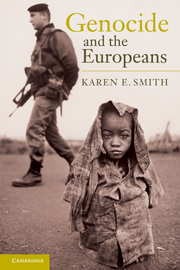Book contents
- Frontmatter
- Contents
- Tables and boxes
- Acknowledgements
- Abbreviations
- 1 The norms against genocide
- 2 European governments and the development of the international legal framework on genocide
- 3 European discourses on genocide during the Cold War
- 4 Bosnia and Herzegovina
- 5 Rwanda
- 6 Kosovo
- 7 Darfur
- 8 Is there a European way of responding to genocide?
- Appendix 1 United Nations General Assembly Resolution 96 (I), 11 December 1946
- Appendix 2 Convention on the Prevention and Punishment of the Crime of Genocide
- Bibliography
- Index
5 - Rwanda
Published online by Cambridge University Press: 05 June 2012
- Frontmatter
- Contents
- Tables and boxes
- Acknowledgements
- Abbreviations
- 1 The norms against genocide
- 2 European governments and the development of the international legal framework on genocide
- 3 European discourses on genocide during the Cold War
- 4 Bosnia and Herzegovina
- 5 Rwanda
- 6 Kosovo
- 7 Darfur
- 8 Is there a European way of responding to genocide?
- Appendix 1 United Nations General Assembly Resolution 96 (I), 11 December 1946
- Appendix 2 Convention on the Prevention and Punishment of the Crime of Genocide
- Bibliography
- Index
Summary
Of all the cases in this book, Rwanda is the most shocking – for two reasons. The first is the sheer mind-numbing scale and speed of the bloodshed: perhaps 800,000 Rwandans, mostly Tutsi, were slaughtered in about 100 days. The brutality of those killings is sickening. Rwanda 1994 is widely considered to be an unambiguous case of genocide, fitting the legal definition of the Genocide Convention. It also sparked an horrendous cycle of violence in the region, including ‘Africa's world war’ in the Democratic Republic of Congo, which at one point involved the armies of seven states (including Rwanda) and assorted militias, and in which it is estimated that at least three million people died between 1998 and 2003. The cycle has still not come to an end, sixteen years later.
The second reason that the Rwanda case shocks is the role that the rest of the world played before, during and after the genocide. Numerous countries and the UN ignored various warning signs before the genocide; the UN and its member states were largely indifferent to the genocide while it was ongoing (and moreover, spent weeks avoiding the use of the term ‘genocide’ to describe events); and most aid after the genocide was sent to sustain Rwandan refugees, including many genocidaires, in what was then Zaire (now the Democratic Republic of Congo) rather than to Rwanda itself.
- Type
- Chapter
- Information
- Genocide and the Europeans , pp. 142 - 178Publisher: Cambridge University PressPrint publication year: 2010



